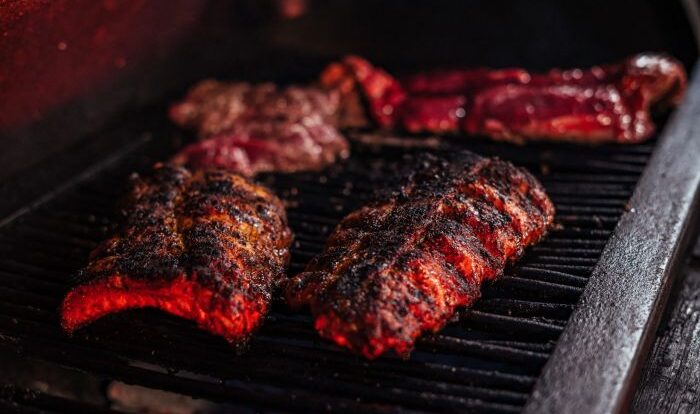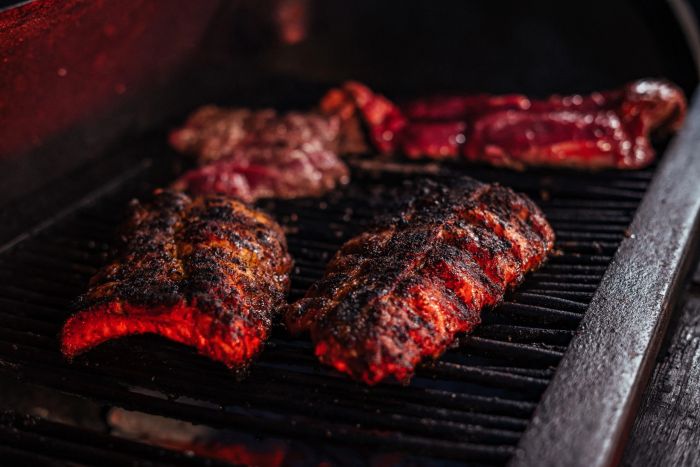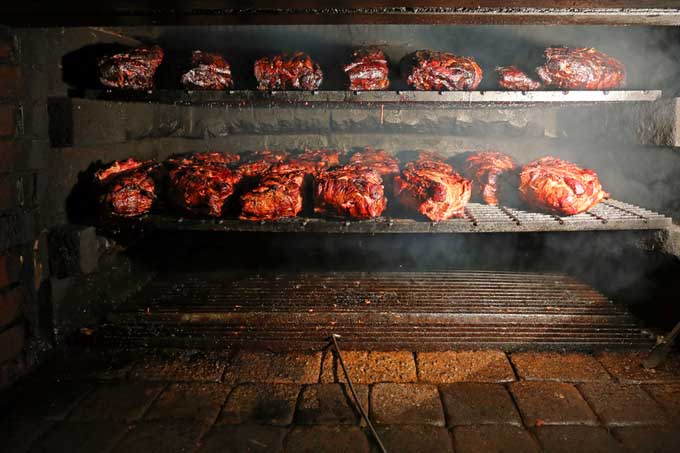
Barbecue is more than just a cooking method in the United States; it’s a cultural phenomenon that reflects the rich history and diverse regional identities of the country. From the tangy sauces of the Carolinas to the smoky brisket of Texas, “Regional BBQ Styles” showcase the variety of flavors and techniques that define American barbecue. This article delves into the unique characteristics of these styles, offering an in-depth exploration of what makes each region’s barbecue special.

1. The Origins of American BBQ
Barbecue in America traces its roots back to indigenous cooking methods and the influence of African, Caribbean, and European culinary traditions. Early settlers adapted these techniques, using local ingredients and resources to create distinct styles. Over time, different regions developed their own signature approaches, influenced by factors such as geography, climate, and cultural heritage.

2. Carolina BBQ: The Art of the Hog
The Carolinas are often considered the birthplace of American barbecue, and their styles focus heavily on pork. There are two main variations:
- Eastern Carolina Style: Known for its whole-hog barbecue, Eastern Carolina style features a vinegar-based sauce with a hint of pepper. The tangy and slightly spicy flavor complements the richness of the pork, creating a balanced and flavorful dish.
- Western Carolina (Lexington) Style: This variation centers around pork shoulder and uses a tomato-vinegar sauce. The addition of tomato brings a sweeter and more robust flavor, distinguishing it from its Eastern counterpart.
Both styles are traditionally cooked low and slow over hardwood coals, allowing the smoky flavors to permeate the meat.
3. Texas BBQ: A Meat Lover’s Paradise
Everything is bigger in Texas, including its barbecue traditions. Texas BBQ is all about the meat, with beef taking center stage. There are four main styles:
- Central Texas: Known for its simplicity, Central Texas BBQ relies on quality cuts of meat seasoned with just salt and pepper. Brisket, smoked to perfection over oak, is the star of the show.
- East Texas: Drawing influences from Southern barbecue, East Texas style features pork and beef cooked until tender and slathered in a sweet, tomato-based sauce.
- West Texas (Cowboy Style): Unlike the slow-smoking methods of other regions, West Texas barbecue uses direct heat over mesquite wood. This results in a distinctively bold, smoky flavor.
- South Texas: South Texas BBQ is known for barbacoa, a method of slow-cooking meat, traditionally in underground pits. Today, it’s often prepared with beef cheeks and served with tortillas and a tangy sauce.
4. Kansas City BBQ: The Sauce Reigns Supreme
Kansas City is synonymous with barbecue sauce, and for good reason. The region’s signature thick, sweet, and tangy tomato-based sauce is a staple in its barbecue tradition. Unlike other regions that specialize in specific meats, Kansas City BBQ includes a wide variety, from pork ribs to beef brisket and even burnt ends—crispy, caramelized nuggets of brisket that are a local favorite.
The meat is slow-smoked over a mix of hickory and other woods, imparting a balanced smoky flavor that pairs perfectly with the bold sauce.
5. Memphis BBQ: A Pork Lover’s Dream
Memphis barbecue is all about pork, especially ribs. There are two main approaches:
- Wet Ribs: These are slathered in a tangy, sweet, and sometimes spicy sauce before, during, and after cooking. The sauce creates a sticky, flavorful glaze that clings to the ribs.
- Dry Ribs: Dry ribs are seasoned with a flavorful rub of spices and herbs before being smoked. The absence of sauce allows the natural flavor of the pork and the rub’s spices to shine through.
Pulled pork sandwiches, often topped with coleslaw, are another Memphis staple.
6. Alabama BBQ: The Unique White Sauce
While not as well-known as other styles, Alabama BBQ offers a unique contribution to the barbecue world: white sauce. This mayonnaise-based sauce, created by Big Bob Gibson in Decatur, Alabama, is tangy and creamy, with hints of vinegar and black pepper. It’s traditionally served with smoked chicken but pairs well with other meats too.
Alabama’s barbecue also includes pork and ribs, with a mix of influences from neighboring regions.
7. Kentucky BBQ: Mutton Madness
Kentucky’s barbecue scene is unique, thanks to its focus on mutton. Owensboro, in particular, is famous for slow-smoked mutton served with a Worcestershire-based “dip” sauce. The strong flavor of mutton pairs well with the bold, tangy sauce, creating a barbecue experience unlike any other.
Burgoo, a hearty stew made with smoked meats, is another Kentucky barbecue tradition worth trying.
8. Pacific Northwest BBQ: A Fusion of Flavors
While not as established as other regions, the Pacific Northwest has a burgeoning barbecue scene that incorporates local ingredients and techniques. Salmon, often smoked over alder wood, is a standout. The region’s barbecue also features creative rubs and sauces influenced by Asian and Native American culinary traditions.
9. The Evolution of Regional BBQ Styles
As barbecue continues to grow in popularity, regional styles are evolving and blending. Modern pitmasters experiment with flavors and techniques, creating fusion styles that honor tradition while introducing new elements. For example, Texas brisket tacos, Carolina-inspired pulled pork egg rolls, and Kansas City-style smoked chicken pizza reflect this innovative spirit.
10. Tips for Exploring Regional BBQ Styles
For those eager to explore America’s barbecue scene, here are some tips:
- Travel to the Source: Visiting iconic barbecue joints in each region is the best way to experience authentic flavors.
- Attend BBQ Festivals: Events like the Memphis in May World Championship Barbecue Cooking Contest or the American Royal World Series of Barbecue in Kansas City offer a chance to sample various styles.
- Try Regional Recipes: Experiment with making regional barbecue dishes at home. From smoking brisket Texas-style to crafting Carolina vinegar sauce, there’s plenty to explore.
Conclusion
The rich tapestry of “Regional BBQ Styles” in the United States reflects the nation’s diversity and creativity. Each region’s unique approach—shaped by history, culture, and geography—contributes to the collective love of barbecue. Whether you’re savoring smoky Texas brisket, tangy Carolina pulled pork, or saucy Kansas City ribs, the world of American barbecue offers endless opportunities for delicious exploration.